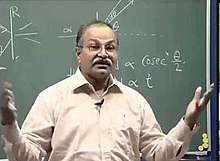H. C. Verma
Harish Chandra Verma (born 8 April 1952) is an Indian experimental physicist and a professor emeritus of the Indian Institute of Technology Kanpur since 1994. His field of research is nuclear physics.[2]
Harish Chandra Verma | |
|---|---|
 | |
| Born | 8 April 1952 Darbhanga, Bihar [1] |
| Nationality | Indian |
| Alma mater | |
| Known for | Concepts of Physics |
| Awards | Maulana Abul Kalam Azad Siksha Puruskar (2017), Padma Shri (2020) |
| Scientific career | |
| Fields | Nuclear physics |
| Doctoral advisor | Prof. G. N. Rao (IIT Kanpur) |
| Website | hcverma |
He has authored graduate, undergraduate and school textbooks. His most popular work is Concepts of Physics, a two-volume book. He has co-founded few initiatives like Shiksha Sopan for the social upliftment of the children of the economically weaker section living near Indian Institute of Technology Kanpur's campus.[3] According to his website, he is currently working on a book about electrostatics, magnetostatics, and electrodynamics for undergraduate students studying science.[4]
In 2020, the Government of India honoured him with the Padma Shri, the fourth highest civilian award in the Republic of India.[5]
Early education
H. C. Verma spent most of his childhood in Patna, and he reflects this fact in some of his books. He was taught arithmetic by his father, Ganesh Prasad Verma, a teacher. After he passed high school, he was admitted to Patna Science College. He never believed in the regimented school life and was an open learner. He himself said, "I am very thankful to my parents to never send me to any coaching classes." He doesn't like children going to coaching classes and strongly believes in self-study as the key to greatness. He had gone through sweet and sour experiences of school education system in India. The education up-to high school (10th) could not create sufficient interest in him, making him poor at studies and even struggle for passing exams. After high school, he joined Patna Science College, a place that moulded a bright spark in to a confident and bright outrageous flame. He came third in Patna Science College in B.Sc., and then topped in M.Sc. in IIT Kanpur. During his PhD, he did many groundbreaking discoveries - crucial to modern physics. [6]
Career
Patna Science College
In early 1980, Verma joined the Patna Science College as a lecturer. He remained in Patna Science college as a lecturer and reader for 15 years before resigning from the college and joining IIT Kanpur.
IIT Kanpur
Verma joined IIT Kanpur in 1994 as an assistant professor. While at IIT Kanpur, he authored "Quantum Physics", and pursued research in experimental nuclear physics. He had also been involved in School Physics Project, Siksha Sopan, and Utsahi Physics Teachers. He retired on 30 June 2017.
He has published 139 research papers.[7]
Bibliography
- Concepts of Physics Part-1, Bharati Bhawan Publishers & Distributors, 1992, ISBN 8177091875
- Concepts of Physics Part-2, Bharati Bhawan Publishers & Distributors, 1992, ISBN 8177092324
- Quantum Physics, Surya Publication, ISBN 9788192571409
- Foundation Science Physics for class 9, Bharati Bhawan Publishers & Distributors, ISBN 9788177097313
- Foundation Science Physics for class 10, Bharati Bhawan Publishers & Distributors, ISBN 9350270064
Online Courses
- Nuclear Physics: Fundamentals and Applications (organised by National Program for Technology Enhanced Learning, NPTEL)
- Learning Physics through Simple Experiments (Massive Online Open Course in 2016)
- Physics of Semiconductors (Massive Online Open Course in 2017)
- B.Sc. courses in Hindi - Basics of Special Theory of Relativity (2018)
Awards
- Padma Shri (2020) [8]
- Maulana Abul Kalam Azad Shiksha Puruskar (2017) [9]
References
- http://www.youtube.com/watch?v=X6-kCilomiQ&t=1m32s
- "Profile of DR. H. C. Verma". Indian Institute of Technology Kanpur. Retrieved 2 April 2016.
- "Spreading the light of knowledge". The Tribune. 31 August 2014. Retrieved 19 September 2014.
- "Electromechanics". HC Verma's webpage. iitk.ac.in.
- "Padma Awards | Interactive Dashboard". www.dashboard-padmaawards.gov.in. Retrieved 26 January 2020.
- Singh, Jitender. "Biography of Dr. H. C. Verma". www.concepts-of-physics.com. Retrieved 2 April 2016.
- Verma, H C. "Prof. H C Verma". H C Verma. Retrieved 10 April 2018.
- https://www.linkedin.com/feed/update/urn:li:activity:6626861712077361152/
- https://www.livehindustan.com/bihar/patna/story-pro-maulana-azad-education-award-for-hc-verma-1632444.html